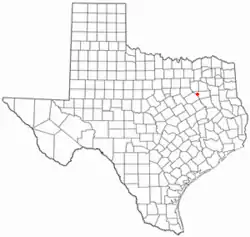Tool, Texas | |
|---|---|
 Location of Tool, Texas | |
 | |
| Coordinates: 32°16′50″N 96°10′22″W / 32.28056°N 96.17278°W | |
| Country | United States |
| State | Texas |
| County | Henderson |
| Area | |
| • Total | 3.60 sq mi (9.33 km2) |
| • Land | 3.59 sq mi (9.30 km2) |
| • Water | 0.01 sq mi (0.03 km2) |
| Elevation | 341 ft (104 m) |
| Population (2020) | |
| • Total | 2,175 |
| • Density | 641.23/sq mi (247.58/km2) |
| Time zone | UTC-6 (Central (CST)) |
| • Summer (DST) | UTC-5 (CDT) |
| FIPS code | 48-73352[3] |
| GNIS feature ID | 1348643[2] |
| Website | tooltexas |
Tool is a city in Henderson County, Texas, United States. The population was 2,175 at the 2020 census.[4] Located on the west side of Cedar Creek Lake, it is a popular second home and retiree destination.
Geography
Tool is located in northwestern Henderson County at 32°16′50″N 96°10′22″W / 32.28056°N 96.17278°W (32.280459, –96.172678),[5] on the west side of Cedar Creek Lake. Texas State Highway 274 is the main road through the city, leading northwest 4 miles (6 km) to Seven Points and southeast 9 miles (14 km) to Trinidad. Athens, the Henderson county seat, is 24 miles (39 km) by road to the southeast of Tool.
According to the United States Census Bureau, the city has a total area of 3.6 square miles (9.3 km2), of which 0.012 square miles (0.03 km2), or 0.36%, are water.[4]
Demographics
| Census | Pop. | Note | %± |
|---|---|---|---|
| 1970 | 258 | — | |
| 1980 | 1,464 | 467.4% | |
| 1990 | 1,712 | 16.9% | |
| 2000 | 2,275 | 32.9% | |
| 2010 | 2,240 | −1.5% | |
| 2020 | 2,175 | −2.9% | |
| U.S. Decennial Census[6] | |||
| Race | Number | Percentage |
|---|---|---|
| White (NH) | 1,835 | 84.37% |
| Black or African American (NH) | 19 | 0.87% |
| Native American or Alaska Native (NH) | 15 | 0.69% |
| Asian (NH) | 26 | 1.2% |
| Pacific Islander (NH) | 4 | 0.18% |
| Some Other Race (NH) | 1 | 0.05% |
| Mixed/Multi-Racial (NH) | 107 | 4.92% |
| Hispanic or Latino | 168 | 7.72% |
| Total | 2,175 |
As of the 2020 United States census, there were 2,175 people, 1,088 households, and 719 families residing in the city.
As of the census[3] of 2000, there were 2,275 people, 1,006 households, and 682 families residing in the city. The population density was 630.6 inhabitants per square mile (243.5/km2). There were 1,416 housing units at an average density of 392.5 per square mile (151.5/km2). The racial makeup of the city was 95.56% White, 0.40% African American, 0.40% Native American, 0.13% Asian, 0.22% Pacific Islander, 1.19% from other races, and 2.11% from two or more races. Hispanic or Latino of any race were 2.33% of the population.
There were 1,006 households, out of which 19.7% had children under the age of 18 living with them, 53.0% were married couples living together, 10.5% had a female householder with no husband present, and 32.2% were non-families. 27.4% of all households were made up of individuals, and 14.9% had someone living alone who was 65 years of age or older. The average household size was 2.26 and the average family size was 2.73.
In the city, the population was spread out, with 19.3% under the age of 18, 5.3% from 18 to 24, 22.7% from 25 to 44, 28.4% from 45 to 64, and 24.3% who were 65 years of age or older. The median age was 47 years. For every 100 females, there were 97.5 males. For every 100 females age 18 and over, there were 94.2 males.
The median income for a household in the city was $32,679, and the median income for a family was $37,396. Males had a median income of $33,534 versus $24,000 for females. The per capita income for the city was $19,507. About 10.8% of families and 15.1% of the population were below the poverty line, including 26.6% of those under age 18 and 7.5% of those age 65 or over.
Education
References
- ↑ "2019 U.S. Gazetteer Files". United States Census Bureau. Retrieved August 7, 2020.
- 1 2 U.S. Geological Survey Geographic Names Information System: Tool, Texas
- 1 2 "U.S. Census website". United States Census Bureau. Retrieved January 31, 2008.
- 1 2 "Geographic Identifiers: 2010 Census Summary File 1 (G001): Tool city, Texas". American Factfinder. U.S. Census Bureau. Archived from the original on February 13, 2020. Retrieved February 12, 2018.
- ↑ "US Gazetteer files: 2010, 2000, and 1990". United States Census Bureau. February 12, 2011. Retrieved April 23, 2011.
- ↑ "Census of Population and Housing". Census.gov. Retrieved June 4, 2015.
- ↑ "Explore Census Data". data.census.gov. Retrieved May 24, 2022.
- ↑ https://www.census.gov/
- ↑ "About the Hispanic Population and its Origin". www.census.gov. Retrieved May 18, 2022.
